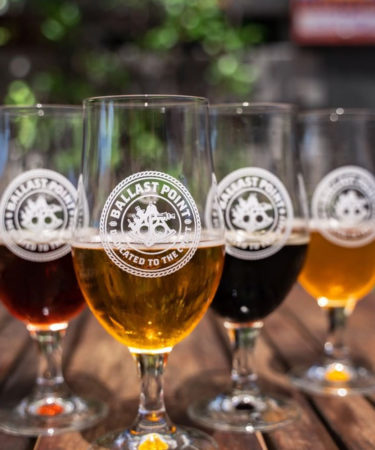The beer world is reeling with the latest big-deal brewery sale: Ballast Point is changing hands from Constellation Brands to Kings & Convicts Brewing, as VinePair reported on Tuesday.
Although details of the transaction were not public at press time, “[a]ccording to people familiar with the matter, prices as low as $100 million for the brand and brewery were in discussion,” Good Beer Hunting reports.
Constellation Brands, one of the world’s largest alcohol companies and third-largest seller of beer in the U.S. (Corona, Modelo, and Pacifico are among its beer brands), purchased Ballast Point for a record $1 billion in 2015. It was the largest craft brewery purchase in history.
At the time, craft beer was booming. Ballast Point in particular was leading the pack with its pricey and popular IPAs, with 6-packs priced well above other similar craft brands and fans willing to pay the price. And so Constellation assumed Ballast Point would continue its upward trajectory as one of the beer industry’s most successful brands.
Unfortunately, that didn’t pan out. Sales sank. Production halved from nearly 400,000 barrels in 2016 to an estimated 200,000 in 2019. And in April 2019, Constellation closed several Ballast Point locations.
Now, Kings & Convicts, a little-known brewing company owned by industry outsiders from the outskirts of Chicago, intends to turn the ship around.
Seems like a lot of you are wondering who we are… our website has crashed! To learn more, try this link: https://t.co/rkywXUElHp
— Kings&Convicts (@KINGSnCONVICTS) December 3, 2019
Kings & Convicts co-founder and CEO Brendan Watters, a former hotel chain owner, says his company is “doing the opposite” of a conglomerate. “We’re saying, ‘Let’s bring it back to independence and innovation and see what happens,’” he told the Chicago Tribune on Tuesday. He continued: “We will build up a new Ballast Point sales force and let the innovation go and get back to the roots. I think it just needs some love and focus and it’ll be fine.”
In other words, Watters claims, Kings & Convicts will fix Ballast Point with human capital and love of the brand.
I don’t buy it. Watters is the former owner of Boomerang Hotels, a group of small-town hotels including Settle Inn & Suites and GuestHouse International. He sold the chain in 2015. He and a group of investors co-founded Kings & Convicts in 2017, a brand he admits “most people in Chicago don’t know,” and that produces 600 barrels of beer annually from its single location in Highland, Ill. (A second location, in Wisconsin, is currently in planning.)
Watters also said he began talks to buy Ballast Point over a casual game of golf with a Constellation executive. He confirmed to the Chicago Tribune on Wednesday evening that one of the investors who helped close the deal — now the company’s largest — is Richard Mahoney, a wine industry bigwig and chairman of the board of The Wine Group, owner of such revered labels as Cupcake and Franzia.
Watters and his Kings & Convicts co-founders and investors are in it for the cash, not the love for craft beer. It’s more likely he saw an opportunity to make a quick buck, maybe by giving Ballast Point the boost it needs, but more likely with the intention to flip a floundering brand.
Ballast Point has long been lost at sea. Kings & Convicts’ purchasing the brand is not going to save it from drowning. Ballast Point can be bought and sold as many times as deep-pocketed investors are willing, but my prediction is it will fail.
White Claw and Coca-Cola Compete for Surge
No, we’re not talking about a surge in popularity or pricing — we’re talking about the literal word “surge.” Last week, Coca-Cola filed a complaint with the U.S. Patent and Trademark Office regarding Mark Anthony Brands’ application to register “White Claw Hard Seltzer Surge,” and as-yet-unannounced product that the soda company claims infringes on its Surge brand of sodas.
According to the complaint, White Claw’s products are “highly similar and/or closely related to the goods for which opposer’s Surge mark is registered, and may be offered, at least in part, to the same or related classes of purchasers, distributed through the same or related channels of trade, and advertised and promoted through the same or similar media channels,” Brewbound reports.
It’s pretty legit. White Claw is obviously having a moment, but Coca-Cola was here first. (Surge has existed since the 1990s.) We’ll side with Coke on this one. But the bigger question is, what was White Claw’s plan for White Claw Surge? We’ll put our money on a bigger, boozier Claw, à la Four Loko Hard Seltzer.
